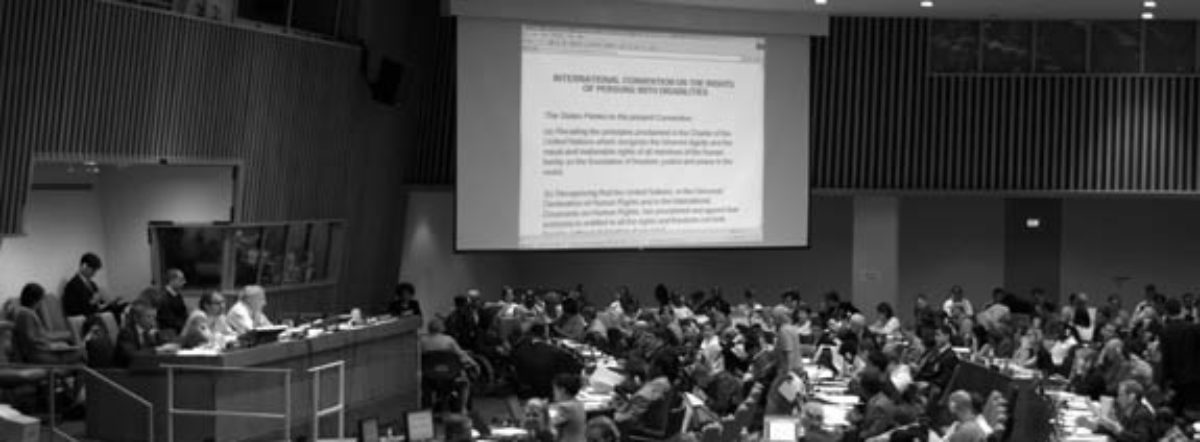*Essential reading
Note: the recorded lectures (links at bottom of page) supplement the readings for this segment and relate to each of the topic areas.
Important: See also materials under Deinstitutionalization – Reparative Justice Approach *
UN materials
CRPD Article 19*
CRPD General Comment No. 1, paragraphs 44-46 & 52*
Special Rapporteur on the Rights of Persons with Disabilities, Report on access to rights-based support for persons with disabilities and/or Easy-to-Read version
OHCHR Report on right to live independently & be included in community
OHCHR report on mental health and human rights*
Special Rapporteur on Health, Report on Mental Health (in part not CRPD compliant, see critical blog post for further context)*
- Questions to consider:
What does Article 19 of the CRPD offer to people with psychosocial disabilities?
How does the right to live independently and be included in the community relate to, and compare with, the right to health?
Is it possible (and is it desirable) to envision a reconceptualization of emotional, spiritual and social support needs entirely within an independent living model under Article 19, to replace the construct of mental health (and mental illness)?
How should UN mechanisms promote such reconceptualization (if desirable and possible)?
What needs to change in state law and policy, and in civil society, in order to make all aspects of community activities welcoming to people with psychosocial disabilities?
How does the creation of an inclusive social environment relate to the abolition of forced psychiatric interventions and psychiatric incarceration?
**
Survivor perspectives
Kalathil, Learning to Live in Nonconsensual Reality*
Kalathil, Power, knowledge and personal narratives
Webinars by RedEsfera Latinoamericana de Diversidad Psicosocial – see especially Diversidad Psicosocial y Orgullo Loc@, Grupos de Apoyo Mutuo, Desmedicalización (in Spanish)
Sarah Knutson, Peerly Human: Why We Need a New Recovery
Report on Transforming Communities for Inclusion-Asia*
Minkowitz, Positive Policy to Replace Forced Psychiatry*
Interventions by persons with psychosocial disabilities in Human Rights Council Consultation on Human Rights and Mental Health – see presentations by Yeni Rosa Damayanti, Bhargavi Davar, Michael Njenga and Olga Runciman, and intervention from the floor by World Network of Users and Survivors of Psychiatry*
- Questions to consider:
Do Mad pride, survivor research, peer support play a role in the survivor movement analogous to independent living in the disability rights movement?
What are the implications of choosing a mental health narrative, an independent living narrative, a Mad Pride narrative, or of simply trying to tell our stories, and listen to those of others, in their own terms?
How can we understand and design supports and services to respond to the great diversity of experiences and the narratives within which individuals understand their own stories?
What is the relationship between support and inclusion in society from a survivor perspective?
What is the relationship between the elements of Article 19 – the right to choose where and with whom to live, to receive support services while remaining in the community, and to have equal access to community spaces and activities – and the full gamut of equal human rights such as adequate standard of living and social protection, employment, education, participation in cultural and recreational activities, political participation, etc.?
Is Article 19 an appropriate vehicle for promoting equal access to the exercise and enjoyment of human rights in general?
**
Implementation
Disability Integration Act (proposed legislation in US) – summary of provisions if helpful, and bill text especially sections 3 and 4*
European Network on Independent Living Manual
Report from meeting on model law of inclusion (a project relating to Korea, Japan and Taiwan)
Minkowitz, Reimagining Crisis Support: Matrix, Roadmap and Policy *
- Questions to consider:
What type of legislative framework, if any, is needed to guarantee the rights of people with psychosocial disabilities to choose where and with whom to live, to receive support services while remaining in the community, and to have equal access to community spaces and activities?
What is the relationship between these rights and the abolition of mental health laws (both in terms of provisions authorizing involuntary interventions, and as legislation that has a segregative impact)?
Is the concept of ‘deinstitutionalization’ adequate to refer to a process by which everyone currently living or incarcerated within an institutional setting is no longer kept there against their will and is supported to leave on their own terms?
How can we ensure that such a process is carried out in ways that do not replicate the stereotypes, aims and power relations of institutionalization?
What is the practical infrastructure needed to design, implement, arrange and provide for the kinds of supports people need?
What role should be played by family members and friends, members of peer support groups, hired employees or staff of programs?
What is the relationship between reparations and inclusive community?
What is the relationship between Article 19 support and Article 12 informal support?
**
Archived materials
Spring 2017: Recording of lecture, slides segment 5 presentation and pdf segment 5 presentation
Assignment
Write your responses to the questions under each topic.
As we continue to work on revisions to this website, we hope to provide webforms and also forums for you to record your reflections and share them.
**
(c) Tina Minkowitz 2020-2022
